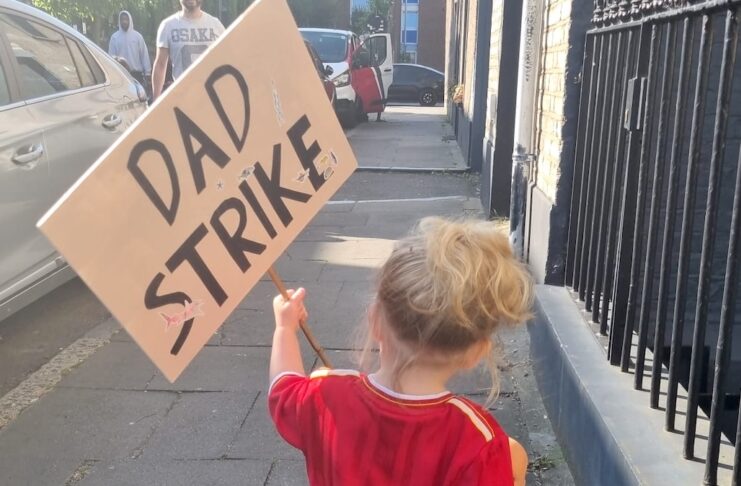Fathers across the UK are preparing to stage the country’s first DadStrike next week, a nationwide protest designed to spotlight what campaigners describe as “Europe’s worst paternity system”. It comes as new data exposes widespread inconsistencies in how employers support new dads, with nearly half still offering only the bare legal minimum.
Due to take place on Wednesday 11 June, DadStrike will see working fathers symbolically withdraw from domestic duties for a day. Its aim, say the organisers, is to expose the gender imbalance in childcare and push for reforms to paternity leave, shared parental leave and workplace culture.
Organised by grassroots campaign group March of the Dads, the action aims to draw attention to what it says is an outdated and unjust system that discourages father involvement from the start of a child’s life.
Research Exposes Gaps in Support
Coinciding with the upcoming protest, a new analysis by jobs platform Resume.io has cast fresh light on how UK employers are – or aren’t – supporting new fathers and partners in 2025.
The UK Parental Support Index, which reviewed the family policies of 500 employers, found:
- Only 58% of employers offer enhanced paternity leave beyond the legal minimum (two weeks at £172.48 per week).
- Just 36% provide enhanced Shared Parental Leave (SPL), despite its potential to promote equitable caregiving.
- The average qualifying period for enhanced benefits is 44 weeks, locking out many new hires.
- The most supportive sectors are Legal, Government Administration, Financial Services, Tech & Software and Business Consulting.
- The least supportive include Manufacturing, Architecture and Hospitality & Travel.
The study notes that while progress has been made in some industries, far too many UK dads remain stuck with inflexible policies and poor financial support.
Why It Matters for Workplace Wellbeing
Experts say that inadequate paternity provision can undermine employee engagement, create stress for new families and contribute to workplace gender inequality.
A father who returns to work after just a fortnight — often unpaid or poorly paid — may feel excluded from early bonding, struggle with mental health, and be less able to support a recovering partner. The knock-on effect on performance, presenteeism and retention is now being recognised by more progressive employers.
With the average UK father taking just 11 days of leave after the birth of a child, according to official figures, campaigners argue that men are systemically discouraged from active parenting, reinforcing harmful gender roles at home and work alike.
Signs of Progress — But Uneven
Some employers are taking proactive steps to stand out. Law firms such as Linklaters, Clifford Chance and Allen & Overy now offer between 12 and 26 weeks of fully paid paternity leave. Tech companies including Spotify and Meta have also led the way internationally, offering generous paid parental leave for all genders.
Yet Resume.io’s research shows that this is still the exception rather than the rule, particularly in lower-paid and operational roles, where qualifying criteria, shift-based contracts and a lack of formal HR policy all contribute to reduced support.
Even Shared Parental Leave, introduced in 2015 to encourage shared responsibility, has been taken up by fewer than 2% of eligible couples each year — in part due to low awareness, financial barriers and inflexible employer attitudes.
Turning Policy into Practice
For HR and wellbeing professionals, rethinking paternity policy is not just about compliance but is a tangible way, say experts, to create fairness, loyalty and a culture of care.
Resume.io’s report recommends:
- Offering enhanced paid leave for all parents, regardless of gender
- Reducing or eliminating qualifying periods to widen access
- Promoting Shared Parental Leave uptake through awareness and financial incentives
- Embedding inclusive family policies in recruitment and retention strategies
As the first Dad Strike approaches, many working fathers will hope this marks the beginning of long-overdue change. The spotlight is now firmly on employers to decide whether their actions reflect the realities — and responsibilities — of modern parenting.


